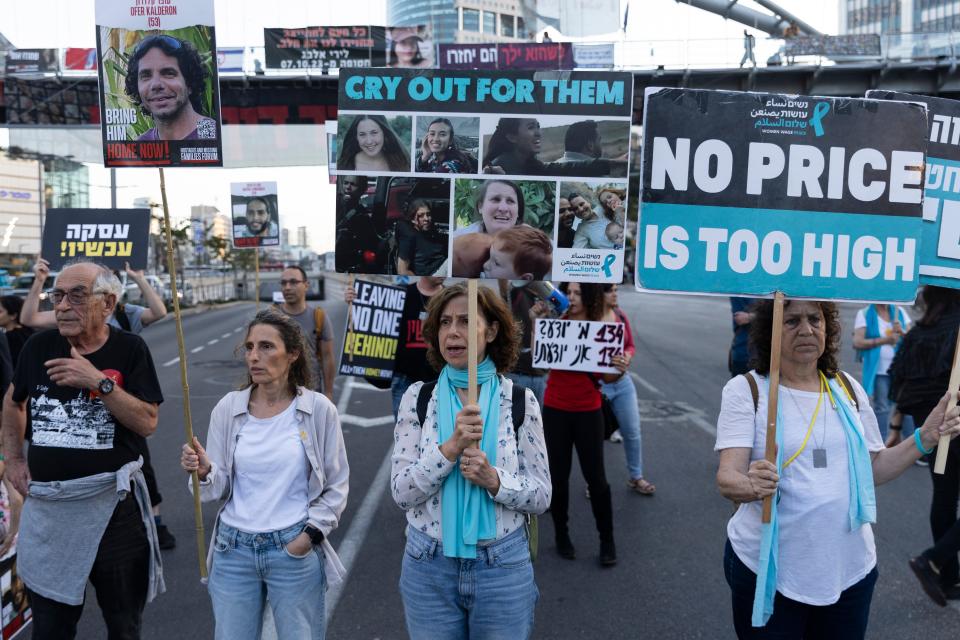What my daughter understands about Israel-Hamas negotiations that Netanyahu can't
Being an Israeli by birth, a hostage negotiator and the father of a 10-year-old can sometimes be the perfect storm for dinner table conversations. I was recently asked by my daughter why a deal between Israel and Hamas has not yet been finalized to save the lives of the hostages. The following is what I came up with.
Simon stole my glass of milk. I really wanted that glass of milk. I needed it.
Simon didn’t accept that the milk was mine. He claimed that my father had stolen the cow that made the milk from his father.
I tried to grab the glass of milk. I lunged toward it, but I couldn’t quite reach it. Some milk spilled as my fingers grazed the contours of the glass.
Simon suggested that if I give him $10, he would give me the milk. I thought about it. But $10 felt too expensive for a glass of milk that was mine in the first place!
After some thought, I came up with an idea. What if I took Simon’s cookie? For sure Simon would be willing to trade the glass of milk for that cookie. Maybe I’d even offer him $5 in addition. So I grabbed his cookie.
Opinion alerts: Get columns from your favorite columnists + expert analysis on top issues, delivered straight to your device through the USA TODAY app. Don't have the app? Download it for free from your app store.
But Simon did not budge. Instead, he asked for the cookie AND the $10 for the glass of milk. I was furious. From my point of view, Simon had just increased the list of demands to give me the glass of milk that was actually mine.
That’s not how Simon saw it. From his perspective, his terms had never changed. He had always agreed to a certain outcome that for him now meant getting his cookie AND his $10 in exchange for my glass of milk.
There was a complete mismatch between my and Simon’s understanding of negotiations. I focus on the transaction; Simon focuses on the outcome of the deal.
Israel and Hamas understand negotiations in very different ways

I now had a few options. I could keep trying to grab that glass of milk. But with every attempt, I would risk spilling some, even if I was able to grab a sip in the scuffle. I could blast Simon’s “irrational” and unjust demands, grabbing more of his cookies. But with every cookie I took, the ultimate price for the glass of milk would increase.
I could also reluctantly return the cookie, pay the $10 and have my glass of milk. But that seems so unjust, and way too expensive.
My friends came up with another idea: Why don’t I return the cookie and give Simon $5 in exchange for half of the glass of milk. While I sip that half glass, I can then decide whether I am willing to give the other $5 in return for the rest of the milk. Either way, at least I get half a glass of milk before I risk losing it all.
Hostage crisis is not a political issue: For five months, we thought our son was alive. Release Hamas hostages and spare others our pain.
My daughter understood what I was saying. Maybe she’ll be a great diplomat one day because even she understands at her young age that true diplomacy requires each party to see the issue at hand from the perspective of the other party, even if they don’t like the negotiating partner.
Israel and Hamas understand negotiations in very different ways. For Israel, it is about the transaction. For Hamas, it’s about the end-state once the deal is completed.
This is at the core of the hostage negotiation mismatch.
When I helped Bill Richardson negotiate for kidnapped Israeli soldier
Israeli Prime Minister Benjamin Netanyahu wholeheartedly believes that the more military pressure, the more land occupied in Gaza and the more the Palestinian people suffer, the better the terms of a hostage deal will be. He is outraged that, with every military advancement, the price for the deal seems to increase. And he uses that argument to justify not reaching a plausible deal that would bring at least 40 of more than 100 living hostages back home.
But from Hamas’ perspective, the terms have never changed. Rather, Israel is moving itself away from their necessary end-state.
How do I know all of this? Because in 2007 and 2008, together with the late U.S. ambassador to the United Nations and former New Mexico Gov. Bill Richardson, we mediated between Hamas and Israel for a deal to free Israeli kidnapped soldier Gilad Shalit.

Hamas’ end-state demands were for the release of more than 1,000 Palestinian prisoners, detained women and children, and several Hamas parliamentarians detained by Israel.
We suggested to then-Prime Minister Ehud Olmert to release the women, children and parliamentarians to the Palestinian Authority, separate from the potential deal with Hamas, in order to remove them from the equation – thus, moving us closer to the end-state.
Hamas negotiators never added additional demands. In fact, they “only” insisted on the more than 1,000 prisoners (a very steep price in itself), which the new prime minister, Benjamin Netanyahu, agreed to release in 2011.
Calling for a cease-fire: Gaza is redefining the Christian vote. Biden and Trump better listen.
Make no mistake, none of the above has anything to do with justice. It has nothing to do with whether Simon’s cow was stolen, whether Simon had the right to steal my glass of milk or whether his cookies were fair game. This is simply meant to explain why we are stuck.
Why six months after Oct. 7, there still remain 134 hostages trapped in Gaza. Every day, every delay, means more hostages will die waiting for that end deal.
How I wish this was about milk and cookies, but it’s not. It’s about hostages suffering and facing death at every moment.
Now is the time to understand the circumstances, make a deal and bring them home.
Mickey Bergman is the chief executive officer of Global Reach, a nonprofit that helps to return Americans kidnapped or wrongfully detained abroad at no cost to their families. He's the co-author of "In the Shadows: True Stories of High-Stakes Negotiations to Free Americans Captured Abroad,” coming June 4.
You can read diverse opinions from our Board of Contributors and other writers on the Opinion front page, on Twitter @usatodayopinion and in our daily Opinion newsletter.
This article originally appeared on USA TODAY: Israel, Hamas negotiations stuck on Gaza hostages. They deserve a deal
